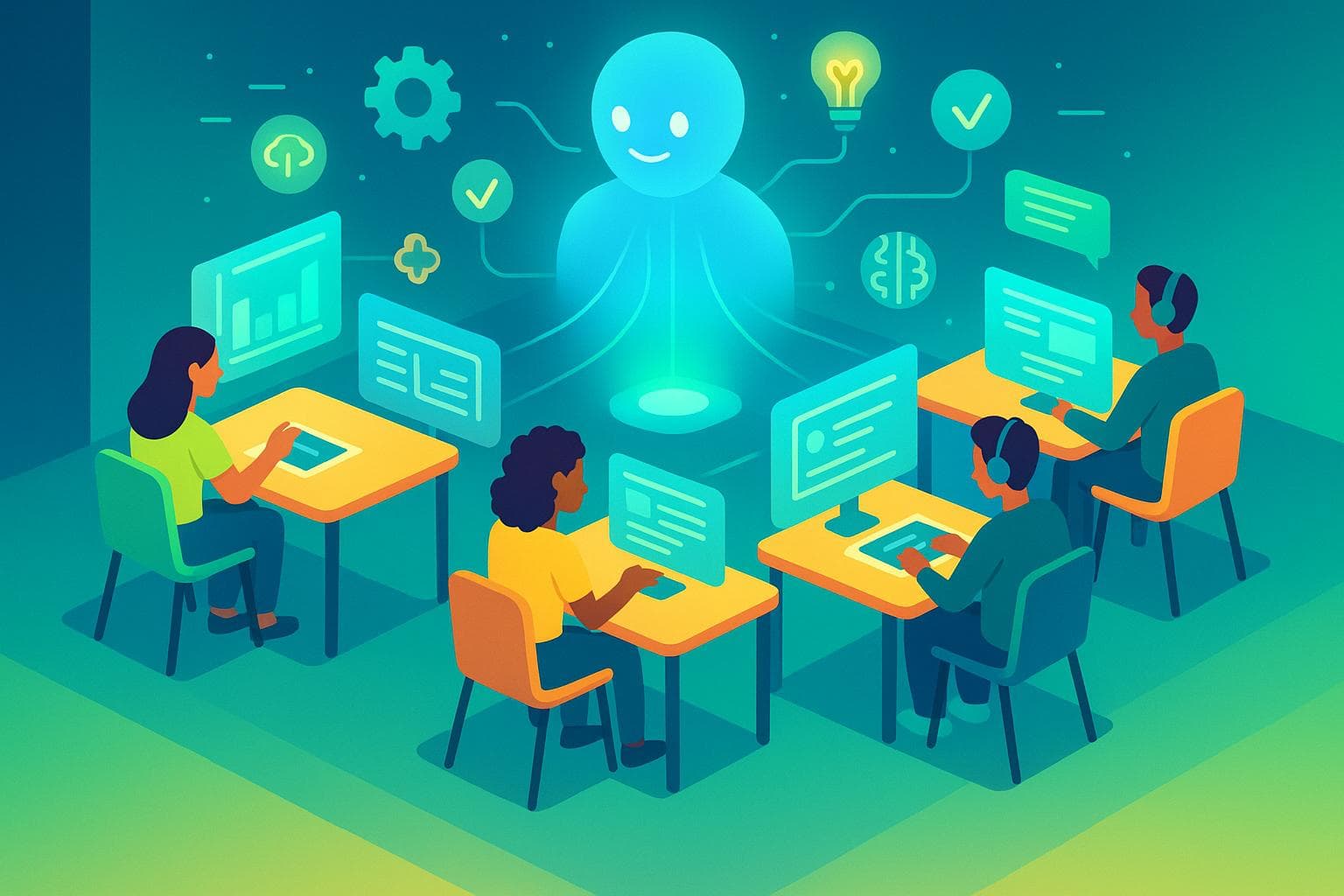
AI Tools for Personalized Learning Paths
AI is changing how we learn by creating tools that adapt to each person's needs. These tools adjust difficulty, pacing, and teaching methods based on real-time performance. Here's a quick look at some top platforms:
- QuizCat AI: Personalized quizzes, flashcards, and podcasts for flexible studying.
- MATHia: Tailors math problems for grades 6–12 with detailed progress tracking.
- DreamBox Learning: Adaptive lessons for K–8 math, available in English and Spanish.
- ALEKS: Open-response assessments for K–12 to college, focusing on strengths and weaknesses.
- Squirrel AI: Detailed concept mapping for K–12 with real-time adjustments.
- Khanmigo: AI-powered tutoring and adaptive learning for all ages.
Quick Comparison
| Platform | Focus Area | Key Features | Who It's For | Cost |
|---|---|---|---|---|
| QuizCat AI | General Learning | Quizzes, flashcards, podcasts | Students, professionals | $0.99 trial, then varies |
| MATHia | Math (6–12) | Adaptive problems, teacher insights | Middle & high school | $15–$30/student/year |
| DreamBox | Math (K–8) | Adaptive lessons, dual-language support | Elementary & middle school | $12.95/month or $99/year |
| ALEKS | Math, Chemistry | Open-response assessments, bilingual support | K–12, college students | Subscription-based |
| Squirrel AI | K–12 Subjects | Concept mapping, multilingual support | K–12 students | $100–$300/month |
| Khanmigo | All Subjects | Real-time tutoring, adaptive sequencing | All ages | $4/month or $44/year |
These tools make learning more personalized, helping students stay engaged and achieve better results. AI in education is also evolving with features like emotion-aware systems, immersive AR/VR learning, and predictive analytics, ensuring education is tailored to every learner.
1. QuizCat AI
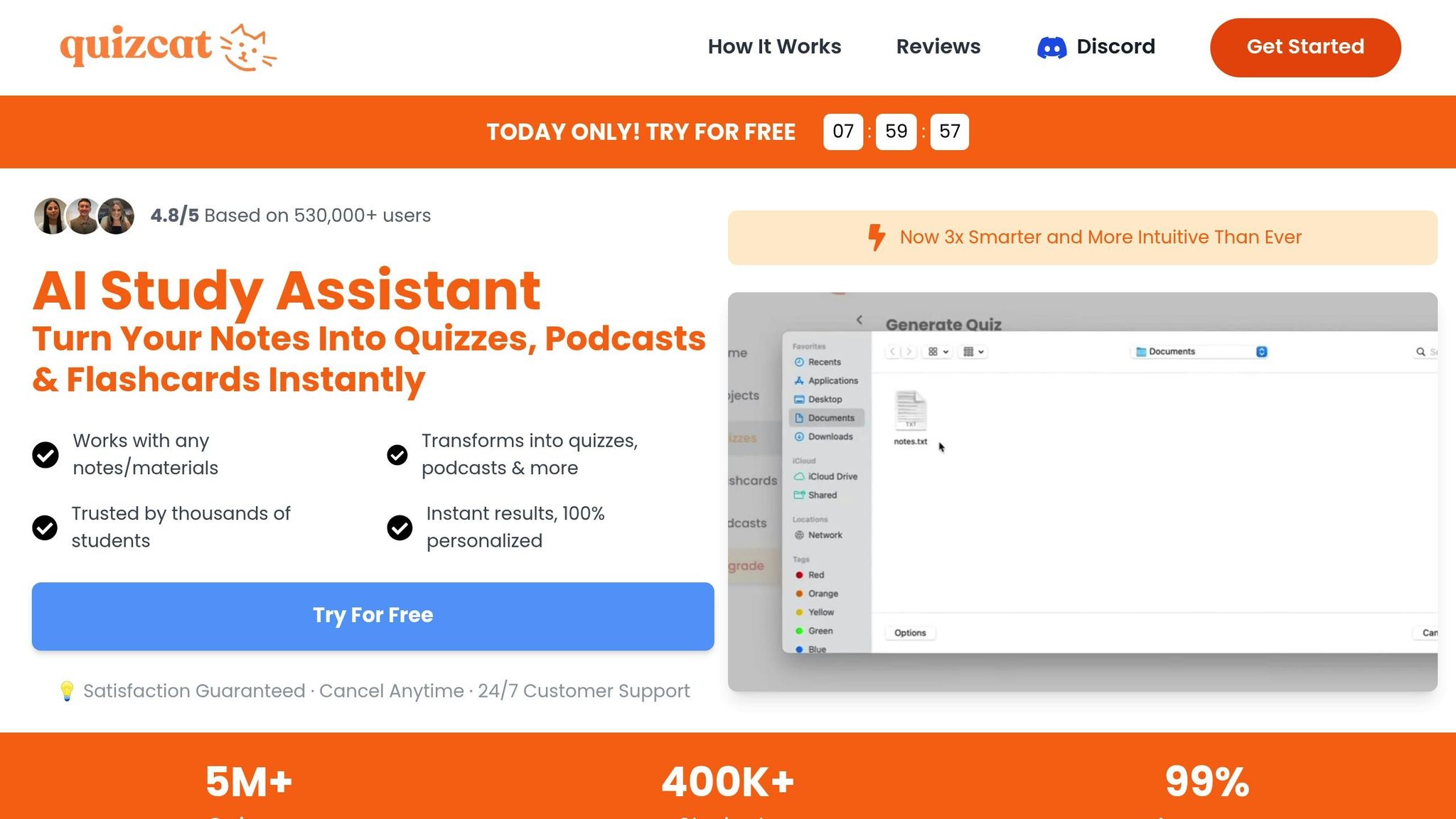
How It Personalizes Learning
QuizCat AI takes studying to a new level by tailoring the learning experience to each user. Using AI algorithms, it analyzes uploaded materials to identify key concepts and create custom content that matches your learning speed. It also tracks performance metrics - like how quickly and accurately you answer questions - to fine-tune your study sessions.
Main Features
QuizCat AI revolves around three standout tools that simplify complex topics and make learning more engaging:
-
Interactive Quizzes
These quizzes are generated by AI, pulling key ideas directly from your uploaded materials. The system adjusts the difficulty of questions based on how you're doing, ensuring you're always challenged but never overwhelmed. -
Dynamic Flashcards
Built on the principle of spaced repetition, these flashcards focus more on concepts you struggle with and less on those you've mastered. With a 4.8/5 rating from over 530,000 users, it's clear this feature is a favorite. -
Smart Podcasts
This feature turns your notes into easy-to-follow audio, perfect for learning on the go. As Ethan Blake puts it:"The flashcards are crazy good, but the podcast feature is my fave. It reads my notes back to me while I'm at the gym or driving. Talk about multitasking!"
Who It's For
QuizCat AI caters to a broad audience, making it a versatile tool for:
- College students preparing for exams
- Professionals juggling work and study
- Independent learners diving into new subjects
- Those with different learning styles, whether visual or auditory
- Anyone eager to study smarter, not harder
Platform Access
QuizCat AI is designed for convenience and flexibility, offering features that fit seamlessly into your life:
| Feature | Details |
|---|---|
| Compatibility | Accessible on any device with internet |
| File Support | Handles PDF, DOCX, and TXT formats |
| Trial Period | First week for just $0.99 |
| Security | Uses advanced encryption to protect data |
| Availability | 24/7 access with cloud synchronization |
The platform’s mobile-friendly design ensures you can study wherever you are - at home, in the library, or even on the go. With over 400,000 active users and more than 5 million quizzes generated, QuizCat AI has proven itself as a reliable and effective study companion. Up next, we’ll look at other AI tools revolutionizing personalized learning.
2. Carnegie Learning's MATHia

How It Personalizes Learning
MATHia stands out for its ability to tailor math instruction to each individual student. Using advanced AI, the platform evaluates how students respond, their pace of learning, and their level of mastery. Based on this data, it adjusts the difficulty of problems, ensuring students build a strong foundation before moving on to more advanced topics. By processing millions of data points, MATHia fine-tunes its teaching approach, which has led to impressive results - students using MATHia often achieve 2-3 times more growth in math skills compared to traditional teaching methods.
Main Features
What makes MATHia effective is its range of adaptive tools designed to meet diverse learning needs:
| Feature | Description |
|---|---|
| Adaptive Problem Sets | Over 180,000 problem variations that adjust dynamically based on student performance |
| Progress Tracking | In-depth analytics to monitor mastery and identify areas for improvement |
| Learning Support | Step-by-step guidance and contextual hints to help students when they’re stuck |
| Multiple Representations | Visual models and interactive simulations to simplify complex math concepts |
| Accessibility Tools | Features like text-to-speech and simplified language for better inclusivity |
Who It's For
MATHia is designed for middle and high school students (grades 6-12). It’s especially beneficial for:
- Students who need extra help with foundational math skills
- Advanced learners looking for more challenging material
- English language learners, thanks to its accessibility features
- Teachers wanting detailed insights into student progress to guide instruction
One inspiring example comes from Westlake Middle School in California. Principal Maria Chen shared:
"After implementing MATHia in September 2021, we saw a 42% reduction in the achievement gap between different student demographics. Our English language learners showed a remarkable 37% improvement in math concept mastery."
Platform Access
MATHia is a cloud-based platform, accessible through modern web browsers on Windows and macOS computers, as well as tablets. Schools typically purchase institutional licenses, with costs ranging from $15 to $30 per student annually, depending on the scale of implementation.
The platform integrates seamlessly with most major learning management systems, making it versatile for both in-person and remote learning setups. Carnegie Learning also offers robust professional development resources to help educators make the most of the platform for their students.
3. DreamBox Learning
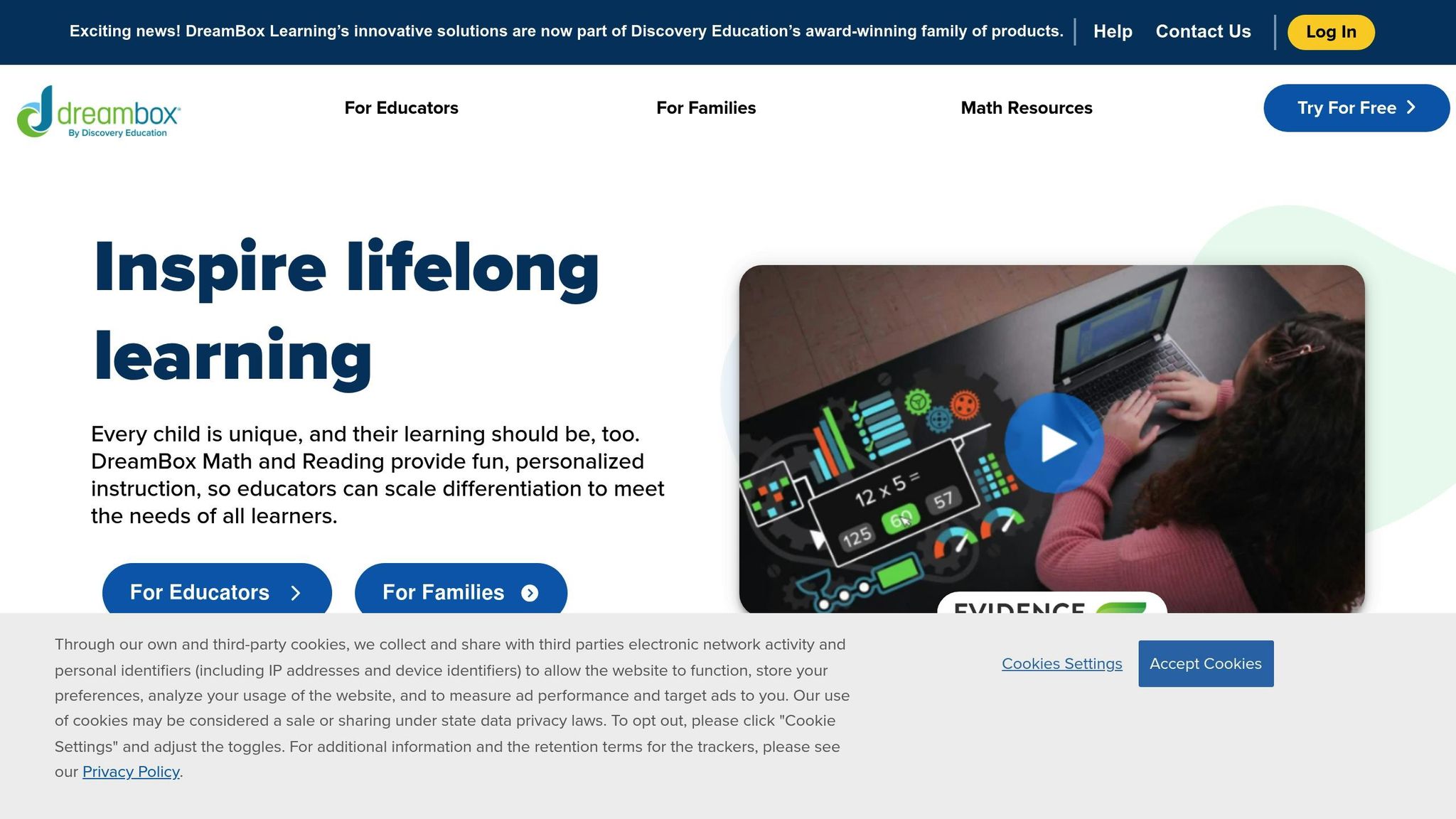
How It Personalizes Learning
DreamBox Learning takes a unique approach to math education for K–8 students, leveraging AI to tailor lessons to individual needs. Its Intelligent Adaptive Learning™ technology is at the heart of this process, tracking an impressive 48,000 data points per student every hour. By analyzing patterns, problem-solving methods, and response times, the platform adapts in real time. This means lessons adjust instantly in difficulty and teaching style, offering alternative strategies when needed and accelerating progress when mastery is achieved.
Main Features
| Feature | Description |
|---|---|
| Adaptive Curriculum | Over 2,000 interactive lessons aligned with national standards |
| Real-time Assessment | Continuous monitoring and dynamic difficulty adjustments |
| Dual-language Support | Lessons available in both English and Spanish |
| Teacher Dashboard | Comprehensive analytics for focused interventions |
| Game-based Learning | Engaging, interactive activities to keep students motivated |
Who It's For
DreamBox Learning is crafted for K–8 students, making it a go-to solution for elementary and middle school math education. Whether students need extra help or are ready for advanced challenges, the platform meets them where they are. For example, a 2018 case study from Howard County Public Schools highlighted a 15% reduction in achievement gaps when students used DreamBox for just 30 minutes, 3–4 times per week.
Platform Access
DreamBox is available through web browsers and iPad apps, ensuring flexibility for both school and home use. It integrates easily with major learning management systems and supports single sign-on, making implementation hassle-free. For individual learners, subscriptions start at $12.95 per month or $99 per year per student. Schools and districts can access custom pricing based on their needs, along with professional development resources for educators.
The platform’s effectiveness is backed by research. A Harvard study revealed that just 14 hours on DreamBox could help students advance by 46 percentile points in national norms. Additionally, students who use the platform for one hour per week see nearly a 60% improvement in math scores compared to those who don’t.
4. ALEKS
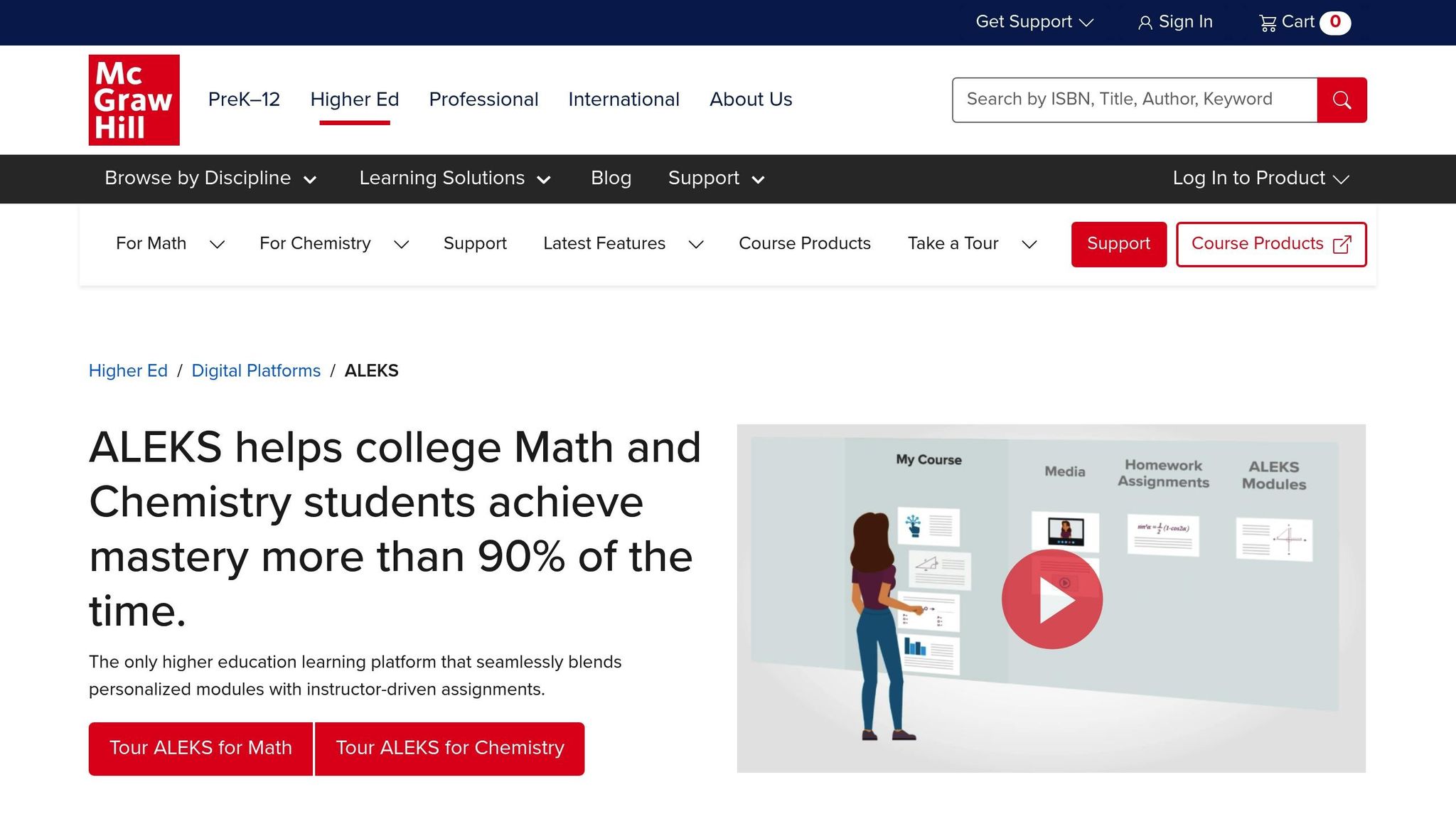
How It Personalizes Learning
ALEKS takes a unique approach to personalized learning by using Knowledge Space Theory. Instead of multiple-choice questions, it relies on open-response formats to evaluate a student's understanding. In just 20–30 questions, the system identifies what the student knows and where they need improvement.
As students work through the material, ALEKS adjusts dynamically. For example, if a student shows strong skills in algebraic equations but struggles with geometry, the platform shifts focus to geometry while still revisiting algebra periodically. This ensures a balanced learning experience that builds on strengths and addresses weaknesses.
Main Features
| Feature | Description |
|---|---|
| Adaptive Assessment | Uses AI-driven open-response questions to evaluate knowledge |
| Content Adjustment | Adjusts material based on individual performance |
| Analytics | Offers detailed progress tracking and insights |
| Bilingual Support | Available in both English and Spanish |
| Mobile Learning | Includes a dedicated app for flexible studying |
Who It's For
ALEKS is designed for a wide range of learners, from K–12 students to college-level individuals, with a focus on subjects like mathematics, chemistry, statistics, and business. One standout example is its impact at Arizona State University, where it significantly improved outcomes in college algebra. Between 2016 and 2018, the program boosted success rates by 27% and reduced drop, fail, or withdraw rates by 41%. Over 35,000 students benefited, and the initiative saved an estimated $12.7 million in instructional costs.
Platform Access
Students can use ALEKS on any standard web browser, and it integrates seamlessly with major learning management systems. Whether on a computer, tablet, or the ALEKS mobile app, users can access their personalized learning paths anytime.
The platform is also highly effective - 94% of instructors report better student performance when using ALEKS. For the best results, students are encouraged to dedicate 3–5 hours per week to the program. Additionally, ALEKS includes accessibility features to support students with disabilities.
5. Squirrel AI
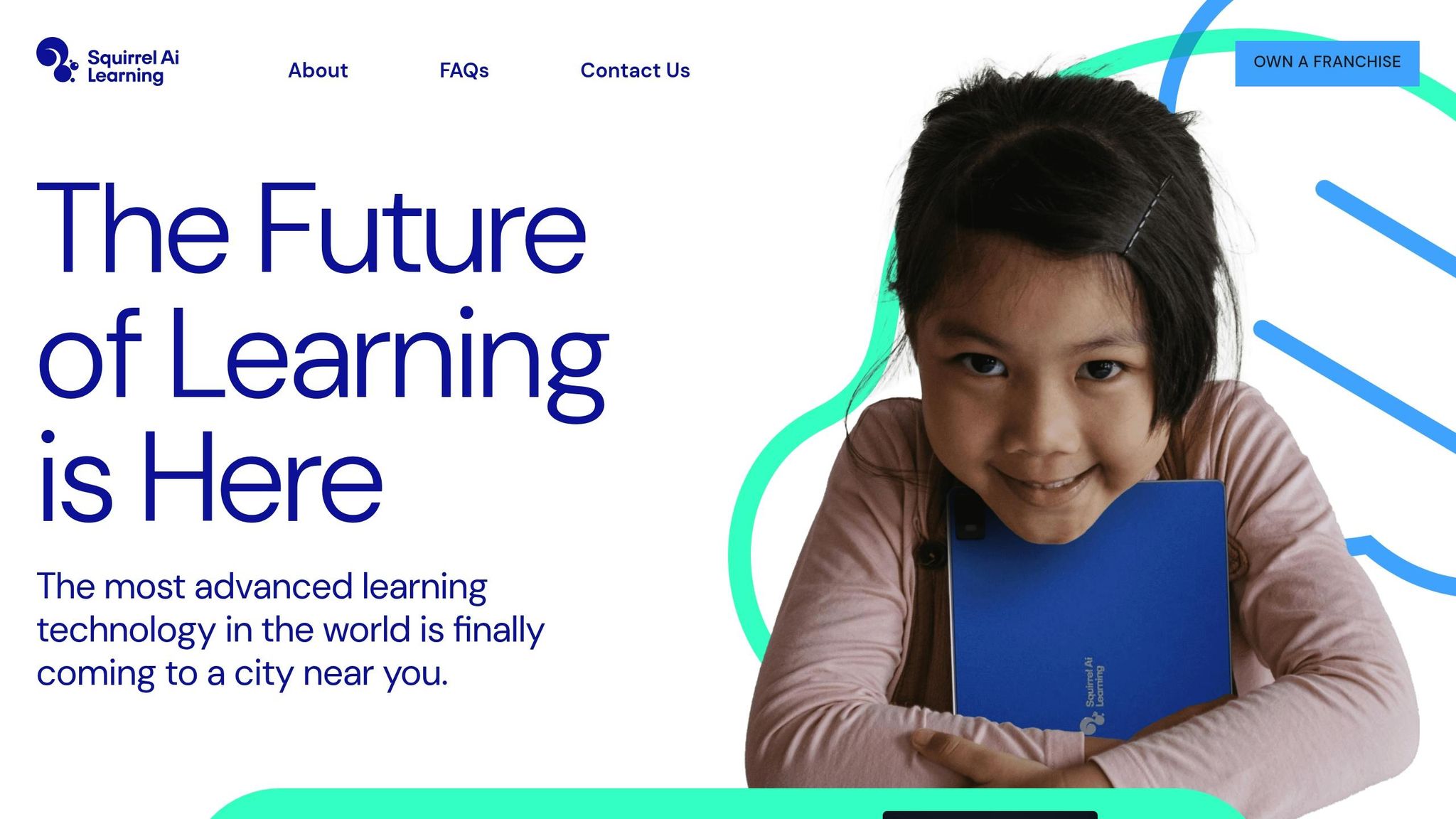
How It Personalizes Learning
Squirrel AI takes personalized learning to a new level by breaking subjects down into thousands of smaller, interconnected concepts. For example, in mathematics alone, the platform maps over 30,000 individual knowledge points, creating detailed connections that help students learn step by step. Using advanced AI algorithms, it analyzes each student’s performance to pinpoint their strengths and areas that need improvement - with an impressive 95% accuracy rate. This approach ensures that learning is tailored to the individual, refining the experience in real time.
The platform’s adaptive engine adjusts the content dynamically. Once a student demonstrates mastery of a topic, the system shifts focus to areas where they need more practice, making learning efficient and targeted.
Main Features
| Feature | Description |
|---|---|
| Granular Knowledge Mapping | Breaks subjects into thousands of detailed concepts for precise learning paths |
| Adaptive Learning | Tailors content and difficulty based on individual performance |
| Multilingual Support | Offers AI tutoring with native-speaker fluency for language learners |
| Accessibility Tools | Includes features like text-to-speech, closed captions, and simplified language options |
| Progress Analytics | Delivers in-depth reports for both students and educators |
Who It's For
Squirrel AI is designed primarily for K-12 students, especially those preparing for standardized exams or needing extra help in core subjects. It’s also a great option for students with diverse learning needs. For instance, a 2019 study in Zhengzhou, China showed that students using Squirrel AI scored 5.4% higher on tests compared to peers in traditional classrooms.
"During a 2018 implementation at Beijing No. 11 School, 132 students using Squirrel AI for mathematics improved their test scores by an average of 27% over one semester, compared to a 15% improvement in the traditional learning control group." (Squirrel AI Research Publication, 2018)
Platform Access
Squirrel AI is available on both web browsers and mobile apps, making it easy for students to learn across devices. The platform operates on a subscription model, with plans costing between $100 and $300 per month, depending on the subjects covered. What makes Squirrel AI stand out is its hybrid approach: it combines AI-driven online learning with physical learning centers across China, where students can get additional in-person support.
To get the most out of the platform, students are encouraged to complete a detailed diagnostic assessment at the start. This allows the AI to build a highly accurate, personalized learning plan. Parents and teachers can also track progress through the platform’s analytics, ensuring students stay on the right path and adjustments are made as needed.
Squirrel AI is a prime example of how advanced analytics and technology are reshaping personalized education.
sbb-itb-1e479da
6. Khanmigo (Khan Academy)
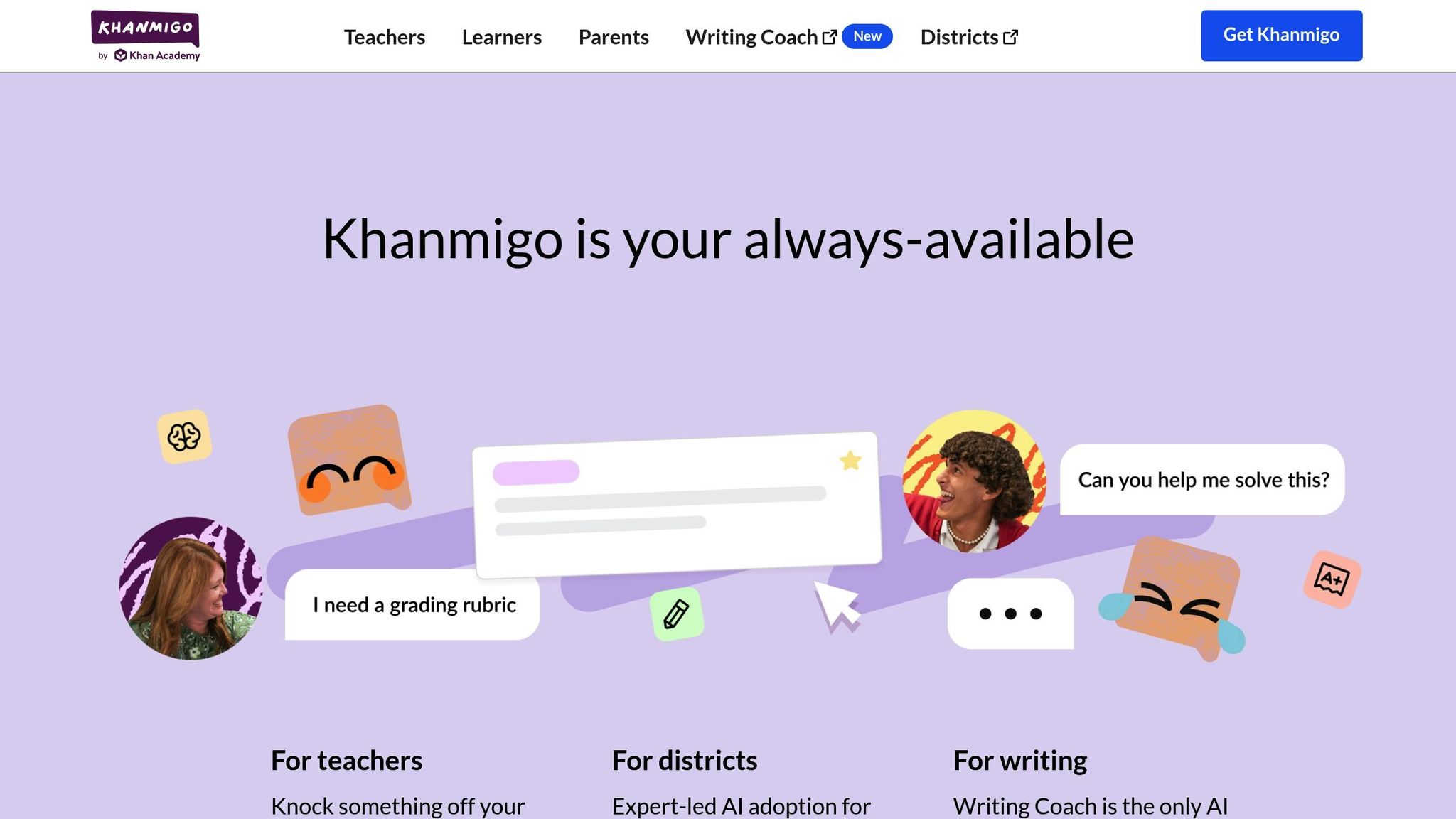
How It Personalizes Learning
Khanmigo leverages AI to evaluate a student's starting skill level and continuously tailors learning paths based on real-time performance. Metrics like completion rates, time spent on tasks, and error trends help the system adapt to each learner's needs.
If a student struggles with a concept, the AI pinpoints the foundational skills they need and offers focused practice. For topics mastered quickly, it moves them ahead to more challenging material.
Main Features
| Feature | Description |
|---|---|
| Real-time Tutoring | Provides step-by-step guidance with helpful hints along the way |
| Adaptive Sequencing | Adjusts problem difficulty dynamically based on how the student performs |
| Progress Analytics | Offers detailed insights for both students and teachers |
| Multi-format Learning | Combines visual, textual, and interactive content for a richer experience |
| Natural Language Interface | Engages students with conversational, easy-to-understand explanations |
Who It's For
Khanmigo is designed for learners of all ages, from elementary students to adults, but it particularly shines in K–12 education. The platform aligns with grade-level standards while catering to individual learning readiness. Research conducted alongside Stanford University highlighted its impact:
- 30% increase in problem-solving persistence compared to control groups
- 20% boost in concept mastery rates, especially in STEM subjects
- Noticeable improvements in student engagement and confidence
Platform Access
Khanmigo is accessible via web browsers and mobile apps for both iOS and Android, with automatic syncing across devices. Subscription options include:
- Individual students: $4/month or $44/year
- Free access for teachers and students in participating school districts
- Volume licensing: Scaled pricing for schools and educational institutions
Khan Academy is committed to making education accessible. They partner with schools to offer subsidized access for underserved communities, helping over 18 million learners each month. The platform is implemented in hundreds of U.S. school districts.
To get started, users complete an initial diagnostic that personalizes their learning plan. Privacy is a top priority, with compliance ensured under FERPA and COPPA regulations. Khanmigo’s adaptive learning model highlights how AI can reshape education by tailoring lessons to individual needs.
AI-Powered Personalization: Transforming Education
What's Next for AI in Education
AI is transforming education at a rapid pace, introducing tools and systems designed to make learning more personalized and effective.
One standout development is emotion-aware AI systems. These tools analyze facial expressions and voice tones to assess how engaged or frustrated a student might be. If a student appears to struggle, the system can simplify explanations, suggest a short break, or offer specific feedback. Studies show this kind of intervention can improve retention rates by as much as 20%.
Another game-changer is blockchain technology, which secures digital credentials. This allows for instant verification of qualifications, portable transcripts, micro-credentials, and easier credit transfers.
Immersive Learning Environments
The combination of augmented reality (AR), virtual reality (VR), and AI is creating some of the most dynamic learning experiences:
- Virtual Labs and Simulations: Medical students can practice procedures in virtual labs, receiving real-time AI feedback without any real-world risks.
- Historical Reconstructions: AI-powered AR and VR bring historical settings to life, adapting narratives to each student’s learning pace.
- Scientific Visualization: Interactive 3D models help students grasp complex scientific concepts, adjusting in real-time based on their understanding.
Enhanced Accessibility Features
AI is also breaking down barriers to learning by improving accessibility. Future systems will provide real-time transcription, automated visual descriptions, adaptive pacing, and customized content, ensuring inclusivity for all learners.
Predictive Analytics and Early Interventions
AI's ability to analyze data will soon allow it to predict student outcomes with greater accuracy. By spotting learning challenges early, these systems can recommend targeted interventions and suggest pathways tailored to individual needs.
Empowering Educators
AI isn’t just reshaping the student experience - it’s redefining the role of teachers. By providing detailed insights into student performance, AI enables educators to focus on what matters most: meaningful interactions and tailored instruction. Instead of simply delivering content, teachers can act as architects of the learning experience.
With these advancements, AI is setting the stage for a future where education becomes more effective, inclusive, and tailored to individual needs. This evolution promises to keep pushing the boundaries of what’s possible in learning.
Conclusion
AI-powered personalized learning tools are reshaping education by moving away from a one-size-fits-all approach to delivering tailored, individualized learning experiences. These tools leverage real-time performance data to adjust content dynamically, proving especially effective in helping students who struggle academically to bridge achievement gaps.
QuizCat AI, for example, showcases the transformative potential of AI in education. By turning study materials into interactive and adaptive tools - through features like smart flashcards, personalized quizzes, and mobile-friendly podcast learning - it enhances the way students engage with content.
Looking ahead, the role of AI in education is set to expand further with advancements such as:
- Emotion-aware systems that gauge and respond to students' engagement levels.
- Immersive learning environments that integrate AI with AR and VR for deeper understanding.
- Predictive analytics that identify students needing support early on.
- Accessibility enhancements that ensure learning opportunities are inclusive for everyone.
These innovations build on the successes of current AI tools, paving the way for even more personalized and effective learning experiences.
By 2025, features like advanced gamification and real-time progress tracking are expected to become standard in educational tools. This progress will make personalized learning more accessible to a diverse range of students, enhancing both engagement and outcomes.
AI tools are not just changing how students learn - they are creating opportunities for more meaningful, engaging, and equitable education tailored to each learner's unique needs.
FAQs
How does QuizCat AI create personalized learning experiences for students?
QuizCat AI transforms your study materials into interactive quizzes, flashcards, and even podcasts. These tools are designed to align with your learning preferences, making it easier to understand key ideas, pinpoint areas where you need improvement, and review on your own schedule.
Whether you're gearing up for exams or diving into a new subject, QuizCat AI helps you study more effectively by zeroing in on what’s most important for you.
What features make AI-powered learning tools effective for students?
AI-powered learning tools, such as Quizcat AI, are transforming how we study by delivering personalized and interactive experiences. These tools can turn your study materials into quizzes, flashcards, or even podcasts, giving you a variety of ways to absorb and retain knowledge.
What makes them so effective is their ability to adjust to your individual learning speed. They help pinpoint areas where you need extra practice, keeping your study sessions focused and productive. By making the process more engaging and efficient, these tools not only help students grasp concepts better but also save valuable time.
How can AI tools like QuizCat AI create personalized learning experiences for students?
AI tools like QuizCat AI are changing the way students learn by creating study materials tailored to their individual needs. With QuizCat AI, you can upload your notes or study materials, and it will transform them into interactive quizzes, flashcards, or even podcasts. This makes it easier to focus on key concepts, test your understanding, and strengthen your grasp of the material.
This approach is especially helpful for students juggling packed schedules or preparing for exams. Whether you prefer quick flashcard sessions, custom quizzes, or listening to podcasts on the go, QuizCat AI adjusts to your learning style and routine, making studying both efficient and engaging.
